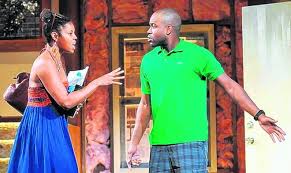
Clybourne Park begins in 1959 where Lorraine Hansberry’s play, A Raisin in the Sun, ended with the decision of an African-American family to move to that white neighborhood. Bruce Norris starts his play at their house in the last days of Bev and Russ, its white sellers, packing to leave.
Their neighbor Karl, much as this character did with Hansberry’s blacks, tries to persuade against both sale and move. He represents an association of neighbors whose socially elitist racism includes fear of their property losing value.
Russ wants to get away from memories of his son’s suicide upstairs. The latter came home from Korea as a soldier implicated in deaths of innocents. Why should Russ care about a community that alienated son and parents? (Does racism figure in Russ’ way of “punishing” those people?)
No less grieving, Bev’s glad for solace offered by minister Jim, though she’s been trying to hide hesitancy about the move. Jim seems even more unhappy about it as he gets involved in Russ’ rejection of Karl’s absurd -- yet very funny -- arguments. That Karl’s brought along his pregnant, deaf wife Betsy makes these often loudly buttressed, and action plunges into farce.
Bev’s interaction with her black maid subtly shows feelings of superiority (as employer and socio-economic better) with perhaps shame about Bev’s son and the neighborhood’s racial reactions to the new owners. After Francine rejects an offer of a silver dish as well as a task of bringing down a trunk from upstairs, Bev isn’t above trying to get her way on both counts when the maid’s husband Albert comes for her.
That Karl and his association did not get their way is apparent as Act II opens, 2009, in the now black -- but gentrifying -- neighborhood and quite altered (gaudily and on the cheap) Act I house. Bought by affluent whites Steve and Lindsey, it has come under the scrutiny of neighborhood board representatives who make decisions on re-zoning rules.
Act II reverses roles of the main Act I actors. Steve (wonderfully keen David Breitbarth, the former jerk but never-cartooned Karl) wants to make the house a mansion with exotic plants and a koi pond. He and his pregnant wife (enthusiastic Sarah Brown, a yearning-for-the-area, yuppie version of her Betsy) face the neighborhood black reps (commanding Tyla Abercrumbie, on-the-mark as is supportive Christopher Wynn in both eras).
Kevin, a successful businessman, stands behind wife Lena, who thinks gentrification is a racial conspiracy. This full-of-attitude lawyer claims a family connection to the house. Steve’s lawyer has a different one: She is Karl’s daughter Kathy. (Annabel Armour handles beautifully the differing racial feelings and ideas of self-worth of Bev and Kathy.)
Tied to the sellers as the minister Jim was previously is the quieter Tom (contrasted by Jesse Dornan) trying to move matters along. Lindsey would just like to settle in to where she’s persuaded Steve their child should live, disregarding neighbors’ races, just as Betsy had been sympathetic to the needs of black people.
But buyers’ and black reps’ misconceptions and miscommunications explode, topped by their release of previously suppressed racial attitudes. Gross racial jokes raise the offensive situation to one of pandemonium.
Into this mess, a worker (whom Douglas Jones makes forceful, like his previous Russ) flings a trunk. Dug up from the backyard, it contains Russ and Bev’s son’s suicide letter.
Coda, 1959: Bev interrupts her uniformed son (wistful looking Jacob Cooper) on their stairway, writing. Bev expresses hope that things will get better and it seems as if that’s affected him positively. But even at this beginning of an end, the play, so astutely directed by Michael Donald Edwards, heightens the author’s motif of appearances vs. reality.
Despite changes in the characters and the house at “Clybourne Park” over a half-century, underlying attitudes, resentments, beliefs, and fears -- especially involving race, social and political power, and property as a primary value -- haven’t satisfied Bev’s optimistic hopes.
How might they fare in another half century, not only in Chicago but all of America? How today? No wonder a variety of Asolo Rep-sponsored discussions follow! And these may be typical wherever theaters visit Clybourne Park.
